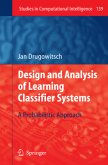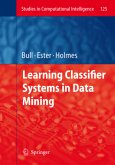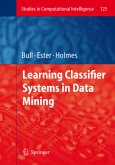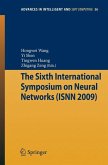This book provides a comprehensive introduction to the design and analysis of Learning Classifier Systems (LCS) from the perspective of machine learning. LCS are a family of methods for handling unsupervised learning, supervised learning and sequential decision tasks by decomposing larger problem spaces into easy-to-handle subproblems. Contrary to commonly approaching their design and analysis from the viewpoint of evolutionary computation, this book instead promotes a probabilistic model-based approach, based on their defining question "What is an LCS supposed to learn?". Systematically following this approach, it is shown how generic machine learning methods can be applied to design LCS algorithms from the first principles of their underlying probabilistic model, which is in this book - for illustrative purposes - closely related to the currently prominent XCS classifier system. The approach is holistic in the sense that the uniform goal-driven design metaphor essentially covers all aspects of LCS and puts them on a solid foundation, in addition to enabling the transfer of the theoretical foundation of the various applied machine learning methods onto LCS. Thus, it does not only advance the analysis of existing LCS but also puts forward the design of new LCS within that same framework.
This book is probably best summarized as providing a principled foundation for Learning Classi?er Systems. Something is happening in LCS, and particularly XCS and its variants that clearly often produces good results. Jan Drug- itsch wishes to understand this from a broader machine learning perspective and thereby perhaps to improve the systems. His approach centers on choosing a statistical de?nition - derived from machine learning - of "a good set of cl- si?ers", based on a model according to which such a set represents the data. For an illustration of this approach, he designs the model to be close to XCS, and tests it by evolving a set of classi?ers using that de?nition as a ?tness criterion, seeing ifthe setprovidesa goodsolutionto twodi?erent function approximation problems. It appears to, meaning that in some sense his de?nition of "good set of classi?ers" (also, in his terms, a good model structure) captures the essence, in machine learning terms, of what XCS is doing. Inthe process of designing the model, the author describes its components and their training in clear detail and links it to currently used LCS, giving rise to recommendations for how those LCS can directly gain from the design of the model and its probabilistic formulation. The seeming complexity of evaluating the quality ofa set ofclassi?ersis alleviatedby giving analgorithmicdescription of how to do it, which is carried out via a simple Pittsburgh-style LCS.
This book is probably best summarized as providing a principled foundation for Learning Classi?er Systems. Something is happening in LCS, and particularly XCS and its variants that clearly often produces good results. Jan Drug- itsch wishes to understand this from a broader machine learning perspective and thereby perhaps to improve the systems. His approach centers on choosing a statistical de?nition - derived from machine learning - of "a good set of cl- si?ers", based on a model according to which such a set represents the data. For an illustration of this approach, he designs the model to be close to XCS, and tests it by evolving a set of classi?ers using that de?nition as a ?tness criterion, seeing ifthe setprovidesa goodsolutionto twodi?erent function approximation problems. It appears to, meaning that in some sense his de?nition of "good set of classi?ers" (also, in his terms, a good model structure) captures the essence, in machine learning terms, of what XCS is doing. Inthe process of designing the model, the author describes its components and their training in clear detail and links it to currently used LCS, giving rise to recommendations for how those LCS can directly gain from the design of the model and its probabilistic formulation. The seeming complexity of evaluating the quality ofa set ofclassi?ersis alleviatedby giving analgorithmicdescription of how to do it, which is carried out via a simple Pittsburgh-style LCS.









